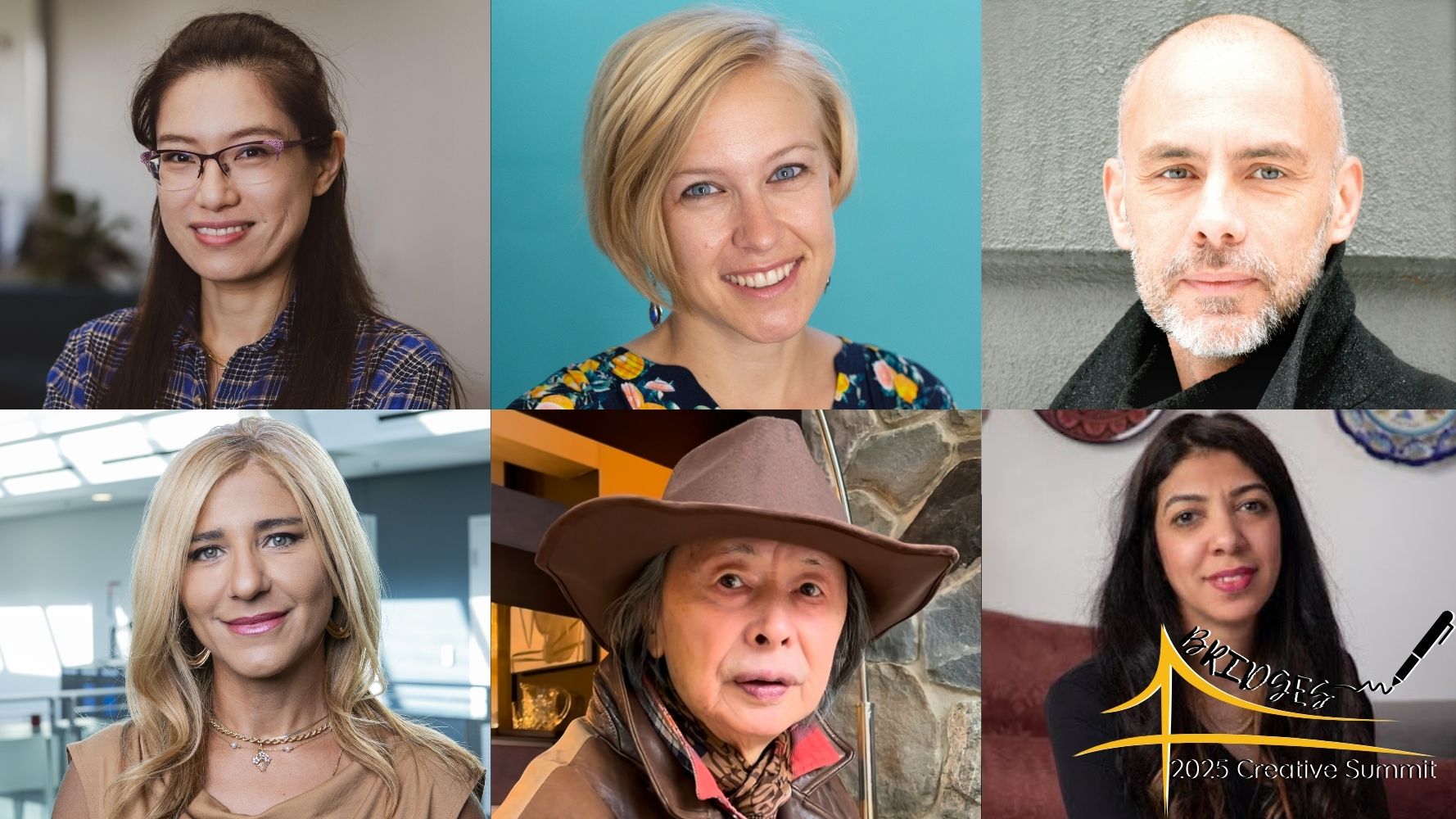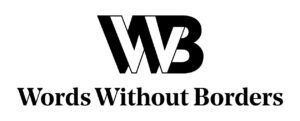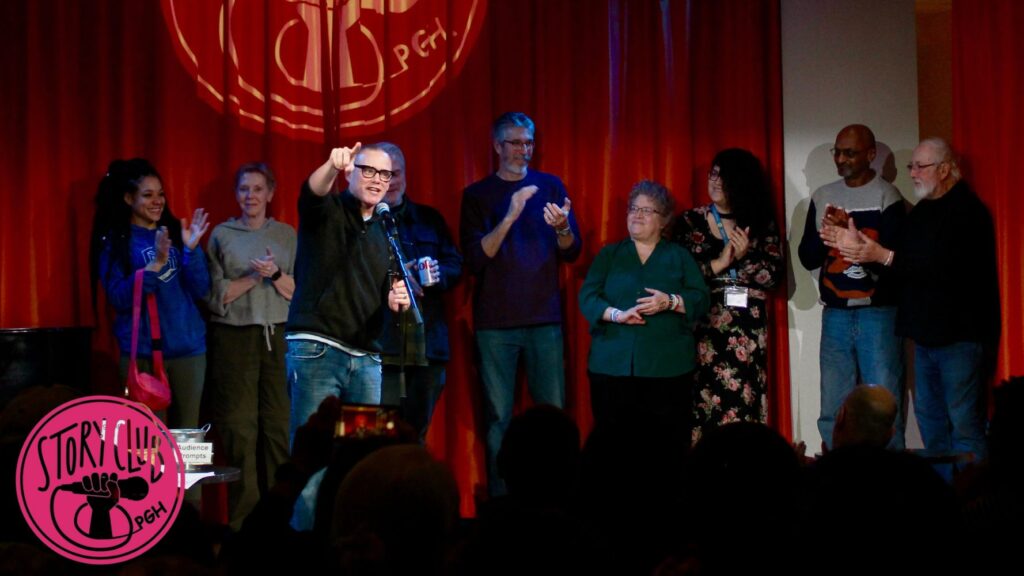
- This Program has passed.
Translation Slam with Nevine Abraham, Elisabeth Jaquette, Nazeeha Saeed, Carla Nappi, Huang Xiang, Fan Fan & Emcee Michael Reynolds
May 22, 2025 @ 4:30 pm - 6:00 pm EDT

Renowned translators compete to see who can produce the best translation from the same source material. The source material is provided to the translators in advance, but the true battle of wits begins on stage at the slam, when the translators present and defend their work under the scrutiny of the author, the emcee, and the audience. The Creative Summit’s translation slam, emceed by Michael Reynolds, Editor-in-Chief of Europa Editions, will feature competitions in two languages: Arabic and Chinese. The Arabic Slam participants include Bahraini journalist Nazeeha Saeed, who will provide the source material; and translators Elisabeth Jaquette, Executive Director of Words Without Borders; and Nevine Abraham, Assistant Teaching Professor and Coordinator of Arabic Studies in the Department of Languages, Cultures, and Applied Linguistics at Carnegie Mellon University. The Chinese Slam participants, University of Pittsburgh professor Carla Nappi and Senior Instructor in the department of East Asian Languages Fan Fan, will go head-to-head over translations of works by prolific poet and former Writer-in-Residence Huang Xiang.
Support for this program is provided by:


About the Emcee:
Michael Reynolds is the Executive Publisher of Europa Editions. He is the recipient of the 2016 Golden Colophon Award for Superlative Achievement and Leadership in Independent Literary Publishing, given by the Community of Literary and Magazine Presses; was a 2017 Epiphany Magazine Honoree for Publishing Excellence; and, in 2020, was named a knight of the Ordre des Arts et des Lettres for his significant contribution to the enrichment of the French cultural inheritance. He has served on the jury for the PEN/Heim Translation Fund, the Gutekunst Prize for Young Translators, and the foreign jury of the Strega Prize. He is a regular speaker at publishing conferences in the US and internationally, a member of the Independent Publisher Caucus Steering Committee, and the founder of Books Across Borders. Prize-winning and bestselling authors he has worked with at Europa include Mieko Kawakami, Elena Ferrante, Amélie Nothomb, Domenico Starnone, Anne Berest, Joseph O’Connor, K Patrick, and Robert Seethaler. Born in Australia, Michael now lives in New York.
About the Writers:
Nazeeha Saeed is a Bahraini Journalist based in Germany, with over 25 years of experience in journalism and human rights issues in the Gulf region and the SWANA region. Nazeeha’s work focuses on human rights, politics, and gender. Nazeeha has won several awards, including the Johann Philipp Palm Award for Freedom of Speech and Press in 2014 and the Heikal Award for Arab journalism in 2021. She is also a Journalist’s Security & Safety, Gender Journalism Trainer. Nazeeha’s work can be found in the New York Times, Raseef22, Amwaj.media, Muwatin.net, and other independent platforms. She co-wrote We Shall Bear Witness, Arab Berlin, and Kein Land, nirgends.
Huang Xiang, a native of Guidong County, Hunan Province, China, was born in December 1941. Huang Xiang began publishing his work in 1958 when his poems were selected in a nationwide poetry collection. He was admitted to the Chinese Writers Association and became its youngest member at 17. Huang Xiang’s writings cover a variety of forms and styles, including poetry, philosophy, essays, prose, political commentary, autobiography, and more. His writing “An Open Letter to President Carter” brought worldwide attention to the human rights movement in China. From 1959 to 1995, he was imprisoned a total of six times (for 12 years) for his determined pursuit of freedom of spirit and expression and human rights advocacy. Between October 2004 and October 2006, Huang Xiang was the first Writer-in-Residence at City of Asylum Pittsburgh. His creation of “House Poem” was the original “House Publication” on Sampsonia Way, featuring his poetry in bold white lettering covering the house’s exterior. In 2005 and 2006, Huang Xiang staged a joint performance in the first and second-ever Jazz Poetry festivals with Oliver Lake, a renowned American jazz musician, in Pittsburgh. In April 2007, Huang Xiang and Oliver Lake were invited to attend the PEN World Voices festival, where they revived their Jazz Poetry performance among appearances by other world-renowned writers, artists, and musicians, including Patti Smith and Elvis Costello.
About the Translators:
Nevine Abraham is Assistant Teaching Professor and Coordinator of Arabic Studies in the Department of Languages, Cultures, and Applied Linguistics at Carnegie Mellon University in Pittsburgh. Her research is positioned at the intersection of literary-cultural studies, indigeneity, and the issues of social justice and minoritization. She examines minorities in the intellectual, social, and political history of the Middle East and North Africa, with a focus on the role of the institutions of power—from imperialism to post-independence nationalism and subsequent regimes—in marginalizing groups, compromising their rights, and shaping their sense of citizenship and belonging. She’s the author of an Online Arabic Language program for beginners, and her publications have appeared in many refereed journals. Her research draws on her teaching to build students’ intercultural competence.
Elisabeth Jaquette is a translator from Arabic and the Executive Director of Words Without Borders. Her translation of Minor Detail by Adania Shibli (New Directions) was a finalist for the National Book Awards and longlisted for the International Booker Prize. Her other translations include Thirteen Months of Sunrise by Rania Mamoun (Comma Press), The Frightened Ones by Dima Wannous (Knopf), and The Queue by Basma Abdel Aziz (Melville House). Elisabeth’s work has also been published in the New York Times, McSweeney’s, The Common, Index on Censorship, and other places. Formerly, she was Executive Director at the American Literary Translators Association.
Fan Fan is a Chinese language educator at the University of Pittsburgh, where she has taught for over a decade. Originally from China, she brings to her work a deep cultural and linguistic knowledge shaped by both personal experience and professional practice. Her teaching focuses on building cultural competence and supporting meaningful communication across languages and communities. She is currently pursuing a doctorate in education with research centered on cross-cultural learning and the role of community in language development. Participating in this translation project marks a new step in her exploration—expanding her work in language education toward deeper questions about how history lives in language, and how poetry carries memory across borders.
About Words Without Borders:
Now in its twenty-first year, Words Without Borders is the premier destination for a global literary conversation. Our mission is to cultivate global awareness by expanding access to international writing and creating a bridge between readers, writers, and translators. Our digital magazine offers unparalleled access to the world’s literary voices, and our education program, WWB Campus, brings global literature into hundreds of classrooms worldwide. Every year, WWB organizes free events with international authors, translators, and critics, providing a space for readers to engage directly with the perspectives we publish.


